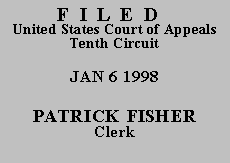

| UNITED STATES OF AMERICA,
Plaintiff-Appellee, v. GARRY DUANE MCCALL, Defendant-Appellant. |
|
Defendant-appellant Garry Duane McCall appeals the district court's denial of his motion to vacate, set aside, or correct sentence pursuant to 28 U.S.C. § 2255. We affirm.
After Mr. McCall pled guilty to wire fraud and mail fraud, he was sentenced to a term of imprisonment which reflected a four-level increase in offense level for being an organizer or leader of a criminal activity that involved five or more participants. See U.S.S.G. § 3B1.1(a). Mr. McCall did not file a direct appeal. In his § 2255 motion, Mr. McCall alleged that he was deprived of effective assistance of counsel by his appointed counsel's failure to challenge the validity of the enhancement or to perfect an appeal.
The district court determined that counsel was effective at sentencing, and referred the issue of ineffective assistance on appeal to a magistrate judge for an evidentiary hearing. A key exhibit before the magistrate judge was a document which stated that Mr. McCall had been advised by his attorney of his "right to appeal the judgment and sentence," and that he did not wish to appeal. R. Vol. I, Doc. 52, Ex. F. Both Mr. McCall and his former counsel testified that Mr. McCall had signed the document four days after sentencing, following a discussion of sentencing issues on appeal. Counsel stated that he believed the document expressed Mr. McCall's informed intention to forgo an appeal. Mr. McCall testified, however, that he was confused by the situation. Contrary to the wording of the document, he had intended to waive his right to appeal the conviction, but preserve his right to appeal the sentence.
The magistrate judge rejected Mr. McCall's claim of confusion, finding that, at the time he signed the document, he "voluntarily, knowingly, and intelligently" waived his right to appeal both the conviction and the sentence. R. Vol. I, Doc. 68 at 4-5. Accordingly, the magistrate judge concluded that Mr. McCall had failed to show ineffective assistance of counsel on appeal and recommended denial of the § 2255 motion.
Upon Mr. McCall's objections to the magistrate judge's report, the district court conducted a de novo review of the record. The court noted the objections to minor factual discrepancies in the report and determined that these alleged errors did not affect the outcome. The district court agreed with the magistrate judge that the absence of a direct appeal was the result of Mr. McCall's decision, not the fault of counsel, and denied the § 2255 motion in its entirety.
On appeal, Mr. McCall reasserts his argument that counsel's failure to perfect an appeal of the sentence amounted to ineffective assistance of counsel. He also contends that, in accepting the magistrate judge's recommendation, the district court violated his due process rights by making credibility determinations without receiving live testimony. We review the district court's finding on ineffective assistance de novo, although we accept the district court's factual findings unless clearly erroneous. See United States v. Blackwell, 127 F.3d 947, 955 (10th Cir.1997).
As we have stated previously,
The Sixth Amendment's guarantee of effective counsel requires that counsel explain the advantages and disadvantages of an appeal, advise the defendant as to whether there are meritorious grounds for an appeal, and inquire whether the defendant wants to appeal his conviction. Counsel retains these obligations unless defendant executes a voluntary, knowing, and intelligent waiver of his right to counsel on appeal.
Romero v. Tansy, 46 F.3d 1024, 1031 (10th Cir. 1995) (quotations and citations omitted). The district court applied these principles to the record before it and concluded that counsel's conduct was entirely appropriate and not constitutionally deficient. Mr. McCall has provided no reason for us to disturb this determination. The court's conclusion was based on the report and recommendation of the magistrate judge, as well as its own de novo review of the record. By statute, the district court may designate a magistrate judge to conduct hearings and submit proposed findings of fact and recommendations for the disposition of, among other things, "applications for posttrial relief made by individuals convicted of criminal offenses." 28 U.S.C. § 636(b)(1)(B). If a party files objections to the magistrate judge's credibility findings, as Mr. McCall did, the district court must undertake a de novo review of the record. Gee v. Estes, 829 F.2d 1005, 1008 (10th Cir. 1987). However, a de novo hearing, with live testimony, is not required if the district court "adopts the recommendation of the magistrate." United States v. Orrego-Fernandez, 78 F.3d 1497, 1501 (10th Cir. 1996).
Here, the magistrate judge's findings manifest his disbelief of Mr. McCall's testimony on his intent to appeal. In conducting its de novo review, the district court accepted the magistrate judge's explicit and implicit findings on credibility, supported them with further citations to the hearing transcript, and adopted the recommendation to deny the motion. Contrary to Mr. McCall's contentions, this is not the rare and "unlikely" case which raises due process concerns because a district judge rejected "a magistrate's proposed findings on credibility when those findings are dispositive and substitute[s] the judge's own appraisal . . . without seeing and hearing the witness or witnesses whose credibility is in question." United States v. Raddatz, 447 U.S. 667, 681 n.7 (1980). The district court's determinations paralleled those of the magistrate judge, so that due process does not compel a second evidentiary hearing. See Orrego-Fernandez, 78 F.3d at 1501.
For the reasons stated above, the judgment of the United States District Court for the Northern District of Oklahoma is AFFIRMED. The motion for leave to file reply brief out of time is granted.
Entered for the Court
Circuit Judge
*. This order and judgment is not binding precedent, except under the doctrines of law of the case, res judicata, and collateral estoppel. The court generally disfavors the citation of orders and judgments; nevertheless, an order and judgment may be cited under the terms and conditions of 10th Cir. R. 36.3.